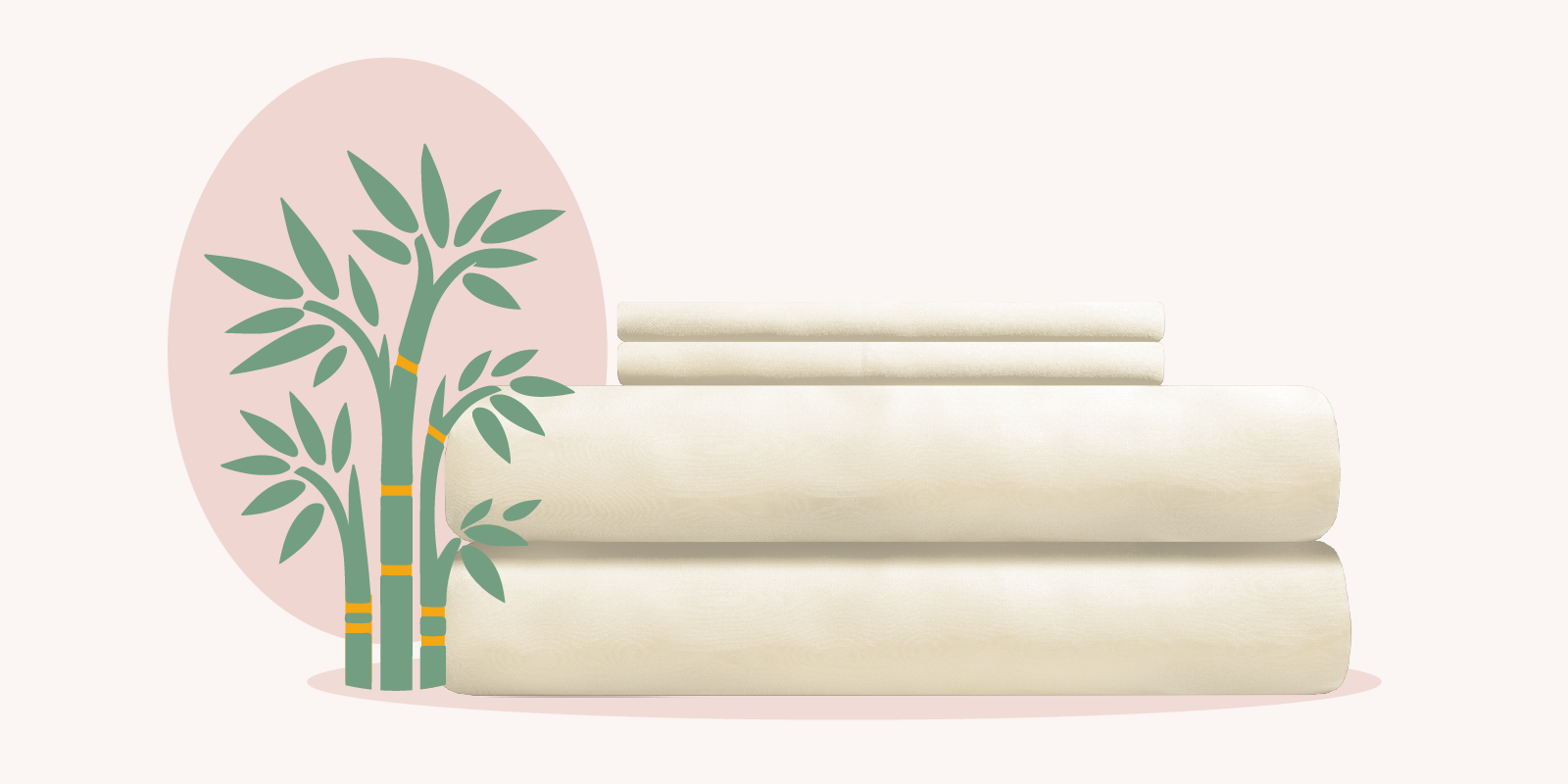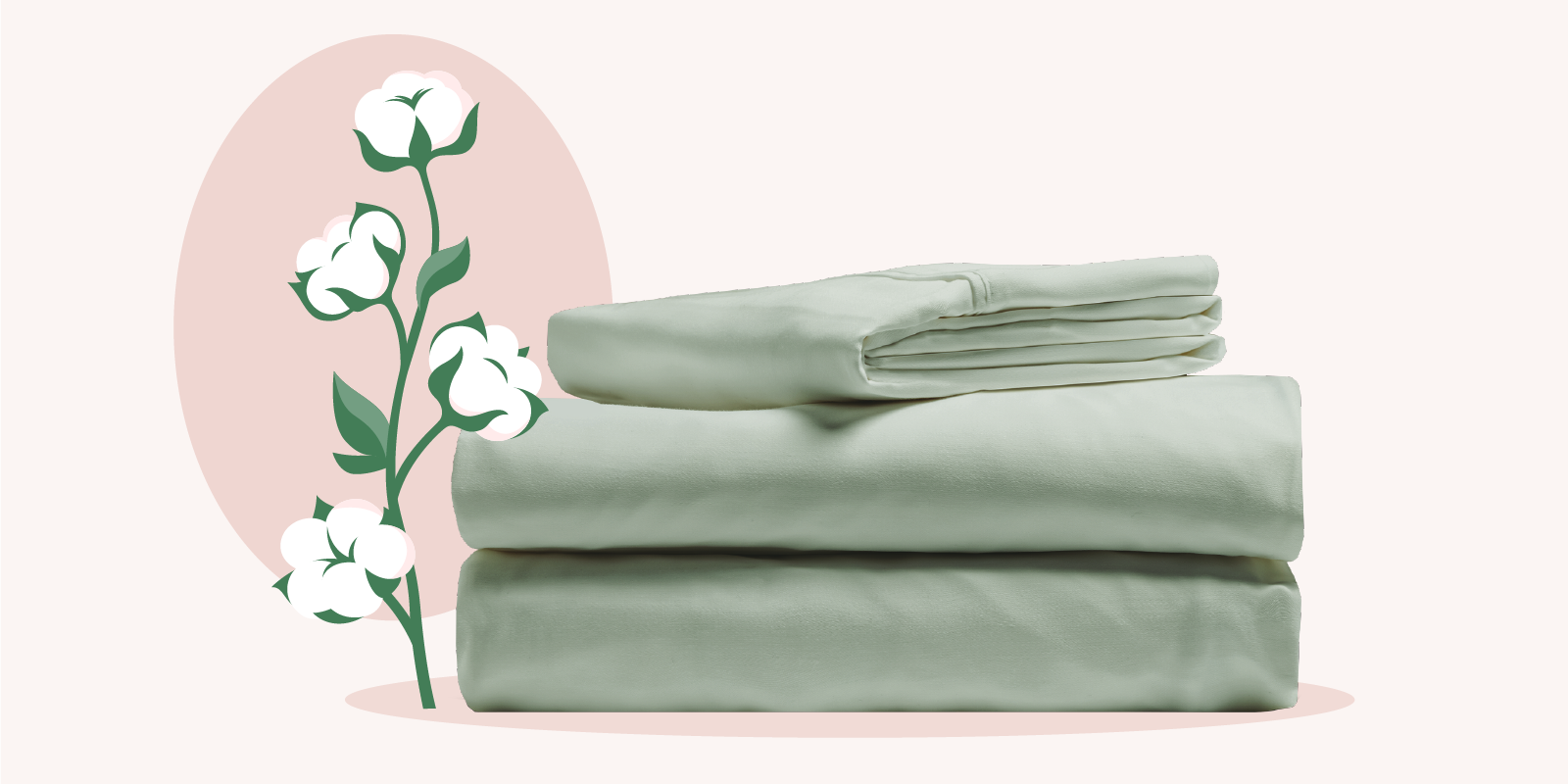Bamboo vs Cotton Sheets (2025)
Updated: March 31, 2025 | Published: May 11, 2024The choice between bamboo sheets vs cotton sheets can be a hard one.
Cotton is a common favourite with its often-affordable price tag and familiar, breathable feel. Cooling bamboo sheets, on the other hand, can sometimes be pricier but offer a silky touch, paired with eco-friendly manufacturing you can feel good about.
In this guide, we’ll compare these bedding options across various categories and break down the differences between cotton and bamboo bed sheets. Together we’ll find the perfect fit for your sleep experience.
Breakdown: Bamboo vs. Cotton Sheets
Read how bamboo sheets and cotton sheets compare:
| Buying Factor | Bamboo Sheets | Cotton Sheets |
|---|---|---|
Cost | $100–200+ | $50–200+ |
Appearance | Matte finish, with certain weaves prone to wrinkling | Smooth, shiny finish, with certain weaves prone to wrinkling |
Durability | Long-lasting with proper care | Long-lasting with proper care |
Machine Washable | Yes, but may need special care | Yes, but may shrink in the dryer |
Variety | Percale, Sateen, Twill | Percale, Sateen, Twill, Jersey, More |
Feel | Luxurious, silky-smooth feel | Soft, breathable feel |
Temperature | Cooling sheets with good airflow | Regulates temperature well |
Best For | People wanting soft, sustainable sheets with less focus on price | People wanting versatile, breathable sheets at a lower price |
READ MORE: What’s the best material for bed sheets?

Bamboo Sheets
Bamboo bedding is crafted from bamboo plant fibres. The extracted fibres are also used to make materials like rayon, modal, and lyocell.
Bamboo fabrics are praised for their comfort and known for sustainability, despite some chemical use in production. That’s because bamboo plants tend to grow quickly, and they need less water and fertilizer than cotton.
Bamboo sheets in Canada come in several different weave options:
- Percale–weave bamboo sheets have a simple one-thread-over, one-thread-under pattern that creates a crisp, lightweight fabric. This design is good for airflow if you overheat while you sleep at night. But beware, percale sheets can wrinkle quite easily.
- Sateen bamboo sheets follow a one-thread-under, three-to-four-threads-over pattern. This weave is known for its silky feel and subtle sheen. Sateen naturally evades wrinkles, giving your bed a smooth, elegant appearance. However, it might retain more heat, and it’s prone to snagging and pilling (small knots in the weave).
- Twill–weave bamboo sheets use parallel ribs in a diagonal pattern, like denim. These may not be as smooth as other weaves, but they’re very durable.
READ MORE: How often should you wash your sheets?
But are bamboo sheets good for your needs? If you’re sensitive to touch or looking for a soft, luxurious feel, then bamboo cooling sheets are absolutely for you.
Here are the pros and cons of bamboo sheets:
| Pros | Cons |
|---|---|
|
|

Cotton Sheets
Cotton bedding is woven from cotton plant fibres, which can come from different types of cotton plants. Cotton demands more water than bamboo during growth, which makes it less sustainable. However, organic cotton is becoming more accessible as a green alternative.
Cotton is a classic bedding choice with many types to choose from. Pima cotton, Egyptian cotton, and upland cotton all offer different softness and durability at different price points—and those are just a few of the cotton types out there.
But like bamboo sheets, it’s more the weave that helps determine how your bedding feels against your body while you sleep.
- Percale–weave cotton sheets use a one-thread-over, one-thread-under pattern. This creates a breathable and moisture-wicking design suitable for warm sleepers.
- Sateen–weave cotton sheets use a one-thread-under, three-to-four-threads-over pattern that feels silky and has a subtle sheen. This type of sheet tends to retain more heat. You might also notice pilling in the fabric over time.
- Twill cotton sheets look like denim, with parallel ribs in a diagonal pattern. This type of cotton bedsheet is very durable, though it lacks the softness of other options.
- Jersey cotton sheets, similar to a favourite T-shirt, bring a stretchy and cozy feel to your sheets when you sleep.
READ MORE: Cotton vs. lyocell sheets: which is best for you?
Cotton sheets can be a bit warmer to sleep in than bamboo sheets. If you sleep hot, you should consider a mattress with cooling features like Octave so you can enjoy deep, restorative sleep.
Octave comes with a CryoFusion™ cooling nanofibre cover to pull sweat away from your body, copper-infused memory foam treated with PolarMAX® phase-change material that adapts to temperature changes, and multi-zone support foam with air channels for air circulation and temperature control. (Check out our guide to the best cooling mattresses while you’re at it.)
Here are the pros and cons of cotton sheets:
| Pros | Cons |
|---|---|
|
|
Should you buy bamboo or cotton sheets?
Which is best for your needs: bamboo bed sheets vs cotton sheets? Both fabrics come in plenty of weaves and price ranges, but each has pros and cons. In the end, it all comes down to preference.
Use this table to pick the best bed sheets for your needs:
| Choose bamboo if… | Choose cotton if… |
|---|---|
|
|
Our goal is to provide the information you need to find the mattress that’s right for you. Get started with some of our most popular mattress shopping resources:
- Best Mattress Guides: Best Mattress Canada, Best Mattress In a Box
- Reviews: Douglas Original, Logan & Cove Choice, Juno, Octave Vista
- Comparisons: Douglas vs Endy, Douglas vs Casper
We use independent, third-party engineering firms (commissioned by us) with the APEGA stamp of approval to conduct mattress testing on our behalf, using publicly available data. We review and test all mattresses on 40+ criteria we think are important to you, including price, country of manufacture, sleep trial, warranty, features, materials used, motion isolation and edge support ratings, customer satisfaction reviews, returns, and refunds.
